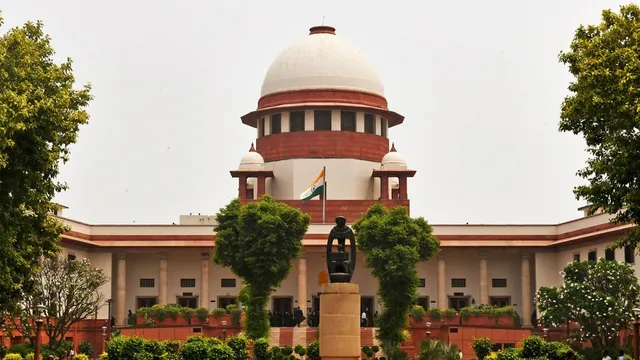- By Priyanka Koul
- Thu, 20 Nov 2025 04:00 PM (IST)
- Source:JND
The Supreme Court on Thursday gave an advisory opinion on whether it can “impose” deadlines on the President and State Governors for taking action on Bills passed by State Legislatures. Chief Justice BR Gavai said that the advisory opinion would be issued “in the name of the court” rather than attributed to any single judge. The Bench collectively decided to present it as a unanimous, collective “Court opinion”.
The Court explained that judges cannot set any timelines for the President or Governors when they are deciding whether to approve Bills passed by state legislatures.
A five-judge Constitution Bench answered President Droupadi Murmu’s questions about delays in approving Bills, Chief Justice of India BR Gavai said that the Bench had agreed to issue the clarification “in the name of the court” rather than crediting any single judge. He added that this meant a “sacrifice” by one judge who had done much of the work in preparing the answers to the President’s questions.
The Supreme Court held that neither the President nor State Governors can be forced to follow fixed deadlines when deciding on Bills. The Bench also emphasised that their actions are not “justiciable” meaning courts cannot review or question their decisions at this stage. Judicial review is possible only after a Bill becomes law.
This advisory opinion was given in response to a request from the President. She sought clarity after a two-judge Bench, in the Tamil Nadu Bills case, criticised Governor RN Ravi for delaying action on ten Bills, calling the delay “illegal and arbitrary”, and setting a three-month deadline for approval of Bills passed again by the legislature.
Under Article 143 of the Constitution, the President had asked, “In the absence of a constitutionally prescribed time limit, and the manner of exercise of powers by the Governor, can timelines be imposed and the manner of exercise be prescribed through judicial orders for the exercise of all powers under Article 200 of the Constitution of India by the Governor?”
The President asked whether the President’s own exercise of constitutional discretion under Article 201 is justiciable. She referred to Article 361 of the Constitution, which provides that the President or a Governor shall not be answerable to any court for the exercise of their powers and duties.
The Bench, headed by Chief Justice BR Gavai, held that imposing a timeline is “strictly contrary” to the Constitution. The other members were Justice Surya Kant, Justice Vikram Nath, Justice PS Narasimha, and Justice AS Chandurkar.
After the court delivered its opinion, Solicitor General Tushar Mehta expressed gratitude, stating, “On behalf of the honourable President of India and on our behalf, we express sincere gratitude for a very illuminating opinion of our lordships.”
The Chief Justice responded, “And I am extremely grateful to all my learned brothers, each of us who has contributed.” He added that one judge had contributed significantly to drafting the clarification and framing the court’s answers to the President’s questions. “On principle, we have decided it would go in the name of the court,” he said.
The Supreme Court further clarified that “the three clear options he has are to either grant assent, return the Bill to the legislature with comments, or refer it to the President. He has discretion in choosing any of these three options.” It stressed, however, that this discretion “cannot allow him to hold Bills in perpetuity”.
The Bench led by CJI Gavai observed that the constitutional structure places the elected government “in the driver’s seat”. “It is the elected government, the Cabinet, that should be in the driver’s seat and that there cannot be two executive power centres,” the Court said, rejecting the Union Government’s contention that Article 200 grants the Governor unfettered discretion.

